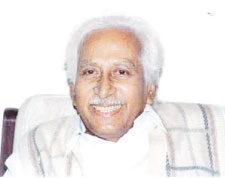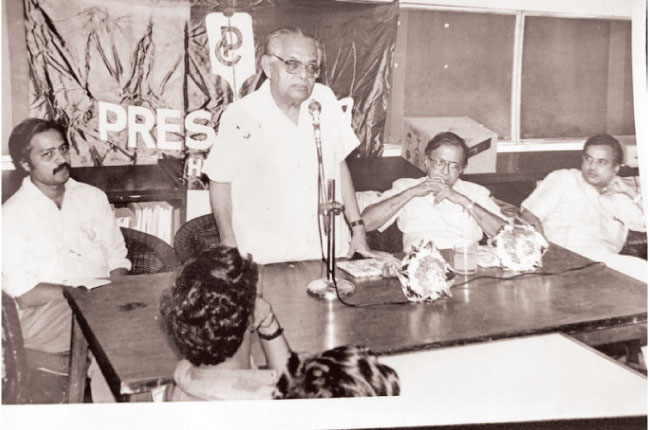The piece today profiles in brief icons in journalism from our subcontinent with whom I had the privilege of listening and learning about our continent some decades if not years back.
Icon of Indian Journalism Nikhil Chakravarty
 Nikhil was born on November 3, 1913 in an educated middle class family of Faridpur district of present-day Bangladesh. After his brilliant performance at Presidency College, Calcutta where he was taught history by the legendary Marxist Professor Susobhan Sarkar, Nikhil went to Oxford University for further studies and got involved in the activities of Indian students in Britain, who were a part of the independence struggle back home.1930’s was a volatile period in world history, especially in Europe, with the rise of Hitler in Germany. Nikhil got involved with the Communist Party of Britain and became close to the veteran Rajani Palm Dutt. It was in London that Nikhil became close to Feroze Gandhi and Indira Gandhi, apart from Bhupesh Gupta, P N Haksar and others.
Nikhil was born on November 3, 1913 in an educated middle class family of Faridpur district of present-day Bangladesh. After his brilliant performance at Presidency College, Calcutta where he was taught history by the legendary Marxist Professor Susobhan Sarkar, Nikhil went to Oxford University for further studies and got involved in the activities of Indian students in Britain, who were a part of the independence struggle back home.1930’s was a volatile period in world history, especially in Europe, with the rise of Hitler in Germany. Nikhil got involved with the Communist Party of Britain and became close to the veteran Rajani Palm Dutt. It was in London that Nikhil became close to Feroze Gandhi and Indira Gandhi, apart from Bhupesh Gupta, P N Haksar and others.
After completing his studies at Oxford with distinction, Nikhil came back to Calcutta and devoted to the work of CPI. He taught for some time at the Calcutta University in the Department of History but soon gave up the job to take up journalism for the CPI papers. He worked for People’s War, People’s Age during pre-independence years. His reports on the 1943 Bengal famine as also the stories and commentaries on the politics of those times, including the internal developments within the Congress leadership, were hugely appreciated. Despite a difficult political period for CPI during war years, People’s War reports were followed by both Mahatma Gandhi and Jawaharlal Nehru and they took note of what Nikhil was writing. Nikhil was also active in the cultural movement of the CPI during those years.
After the second party congress of CPI in Calcutta in 1948, the adventurist line of B T Ranadive led to convulsions. The party was banned. Nikhil as a disciplined member went by the official decision. After the ban on CPI was lifted and the first general elections were held in 1951-52 Nikhil shifted to Delhi as his wife Renu Chakravarty was elected to the Lok Sabha. From 1952to till his death on June 27, 1998, for 46 years, Delhi was his field of activity as a journalist.
After settling in the national capital, he worked at ‘Crossroads’ for two years and then joined the CPI weekly ‘New Age”. He was itching to do something innovative on his own. Finally, he founded India Press Agency (IPA), a new type of commentary service for the medium and smaller newspapers, with the objective of feeding them sharp news analysis focusing on the urgent issues of the day. He was joined by David Cohen, another legendary communist journalist, a Calcutta-based Jew. In 1962, Nikhil founded the weekly Mainstream and ran it until a few years before his demise. His son SumitChakravartywas running itsubsequently.
Nikhil was always encircled by media people as also, bureaucrats, historians, economists- all sorts of people. He was a great storyteller. He used to narrate little known incidents about famous political leaders including the left leaders. Many people came to him for assistance in getting their jobs done. His was an open house. He refused Padma Bhushan offered by the V P Singh government in 1990. He pointed out at that time that a journalist carrying out his professional obligations should not appear to be close to any government or any political establishment. A commemorative issue of Mainstream, released at a seminar organised by the Editors Guild of India in New Delhi yesterday, records: “He always called himself a ‘reporter’. He did have the finest attributes of a reporter, and despite airing his own views in commentaries and editorials never discarded fairness in reporting or tampered with facts. “His fidelity to facts was extraordinary. And he knew what to report and what not to report—always preserving the confidence reposed in him by his interlocutors.”He was always willing to convey and impart knowledge to younger folk. In his heyday it was said any PM India would answer the phone of he called.
KG Mustafa
KG Mustafa was journalist, columnist, language movement activist and former ambassador. He was born at Kuripara in Sirajganj in 1928. His full name was Khondakar Golam Mustafa. Mustafa passed Matriculation examination in 1944 from Banwarilal High School of Sirajganj and then studied at intermediate level initially in Pabna Edward college and then in Islamia College of Kolkata. He obtained BA (Hons) degree in Political Science from the Dhaka University in 1951. While an MA student, he got involved in the movement of the fourth class employees along with Bangabandhu Sheikh Mujibur Rahman and was expelled from the university. KG Mustafa actively participated in the language movement of 1952. He obtained MA degree in Political Science in 1957.
While studying at Islamia College, he took up journalism as his profession and joined the Daily Azad of Kolkata. Later, he worked in the Dainik Insaf, Dainik Ittefaq, Bangladesh Observer, Dainik Purbakone and the Sangbad. He was the editor of the Dainik Muktakantha in the late 1990s. He was the president of the Pakistan Federal Union of Journalists and was the founder president of Bangladesh Federal Union of Journalists.
KG Mustafa also worked as a correspondent of the weekly Iraq Today and the Daily Baghdad. KG Mustafa received the prestigious Ekushey Padak in recognition of his participation in the 1952 language movement. In addition, he received a number of awards for his contribution towards journalism. He played a significant role in the development of journalism in the country. He had also been the leader of the journalists for a long time. KG Mustafa was the ambassador of Bangladesh in Lebanon from 1972 to 1974 and then in Iraq from 1974 to 1975. He was also involved in the communist movement for a long time. He died on 13 March 2010. He was 82, and he left behind wife and three sons.
A remarkable feat attained by him was the fact he was President of Pakistan Federal Union of Journalists at one point. The respect with which he was regarded years later in divided Pakistan I witnessed in Lahore. He clearly had charisma to span what became two countries.







